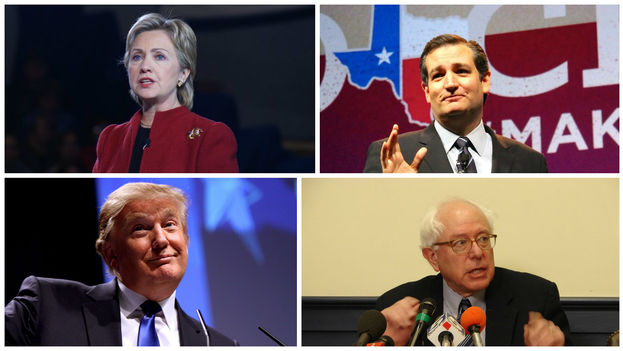
![]() 14ymedio, Pedro Campos, Havana, 11 April 2016 — The current election campaign in the United States has been characterized by low blows and “disqualifications” in the Republican camp where, at this point, the person not wanted by the party establishment, Donald Trump, appears to be in the lead, with the entire structure of the party trying to cut the floor out from under him and supporting his opponent Ted Cruz, who carries Cuban blood.
14ymedio, Pedro Campos, Havana, 11 April 2016 — The current election campaign in the United States has been characterized by low blows and “disqualifications” in the Republican camp where, at this point, the person not wanted by the party establishment, Donald Trump, appears to be in the lead, with the entire structure of the party trying to cut the floor out from under him and supporting his opponent Ted Cruz, who carries Cuban blood.
The frontrunner is accused of being an extremist, fascist, crazy. While they crucify Cruz as impertinent, lacking charisma, and too conservative in religious matters, although both can claim another image in front of the national convention. It is well known: a fascist extremist and an impertinent extreme conservative do not have many chances in modern US presidential elections.
The Democrats, Hillary Clinton and Senator Bernie Sanders, project more presidential images and no one could accuse them of being extremists in any sense.
Trump assumes positions that concern a good share of the American public, and many around the world, because of their implications for the economy and security, but his insults to the establishment and his ordinary manners appeal to a part of the electorate tired of the dominance of a tax-imposing political class.
The lack of democracy within the Republic Party is seen is the maneuvers its establishment is using to try to unseat the billionaire during the party convention. This has led the candidate to consider the possibility of leaving the party, but so far there is nothing definite.
In the presidential elections in the United States the figure, respect and sympathy inspired by the candidate weigh heavily, as does his or her platform and the money to support a campaign.
Some analysts believe that the Republicans are already defeated because they failed to advance a candidate from the beginning with the weight and personality capable of uniting the party. But they have fought among themselves, and so have been weakened in the ultimate battle against the Democratic candidate and, at this point, “inventing” a winning candidate could result in a disaster for the party.
The campaign for the Democratic nomination has been cleaner and with greater unity and coherence. Clinton is ahead and, if nominated, could become the first woman president of the United States, a great attraction indeed. In addition, her skills were demonstrated from the State Department.
Sanders, without backing from millionaires or the establishment, has built his campaign from small donations from young people and workers who, weary of the great social differences and the abuses of power, want systematic changes; an outcome of the Occupy Wall Street movement. He is not a common socialist, and no one questions his commitment to democracy. His discourse has forced Clinton to declare that “companies must distribute part of their earnings to their workers.”
A common problem for the Democrats is mobilizing the vote of their historic base: Hispanics, blacks, workers and the middle class. A controversial or socialist candidate as their nominee could encourage these voters to go to the polls.
A Clinton-Sanders combination would unite a part of the establishment with some of its challengers, women, the liberal left and the traditional Democratic base; but it could be too far to the left of the traditional axis of the electorate, However, since Obama the Democrats seemed to have moved in that direction. However, both Clinton and Sanders come from the Northeast, so they may prefer a running mate from the South or West to gain greater support in those regions.
Traditionally, if the economy grows, if unemployment is at tolerable levels, if the rate of inflation is not elevated, if there are no international conflicts that jeopardize national security and if the outgoing government is viewed favorably, the candidate of the current president’s party has a greater chance of winning.
From here to November, everything will depend on the eventual changes that could occur in these parameters and on the level of unity and coherence that is finally achieved at each party’s convention, which, for now, favors the Democrats.
Without dramatic changes in these aspects, either of the Democratic candidates or a combination of them both would be more likely to win over any of the Republicans, who are still burdened by the novelty of an agitator with popularity among the Republican base but with positions that are too controversial to unite the party and defeat the Democrats. But a lot can happen between now and November.
